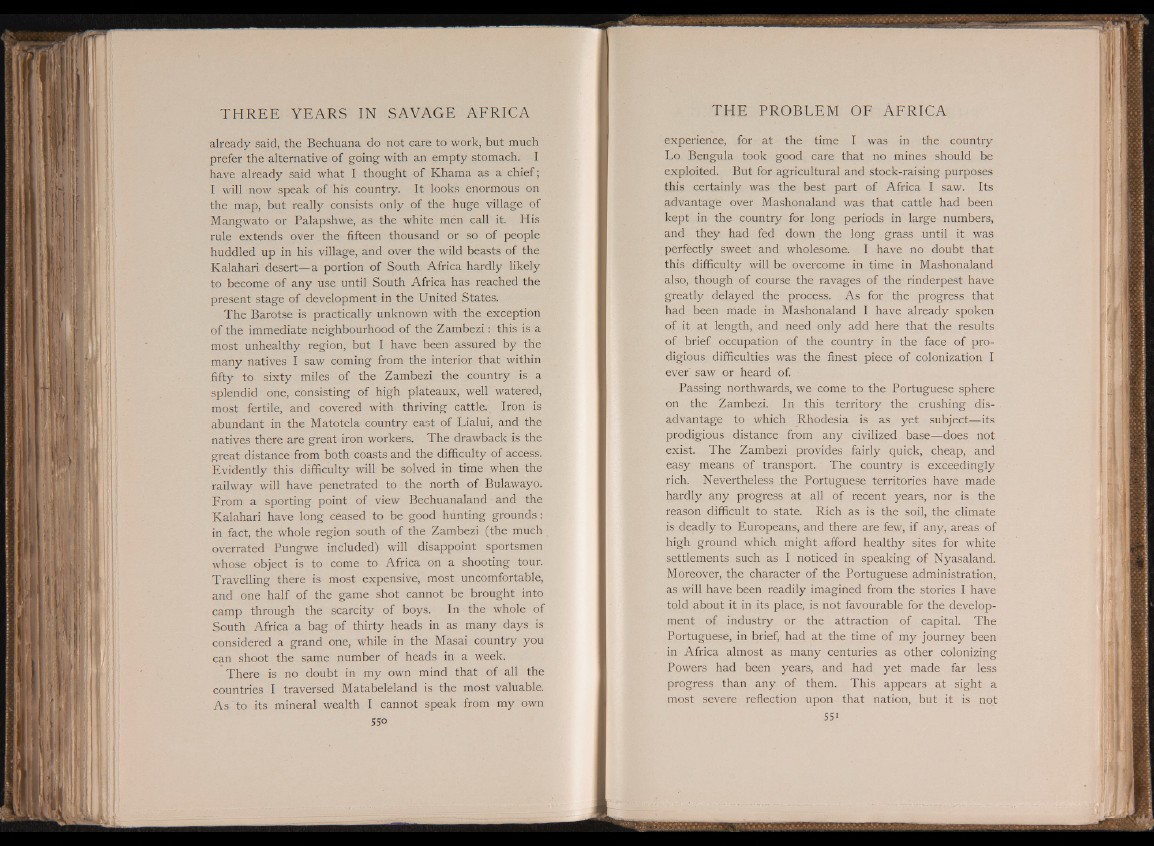
already said, the Bechuana do not care to work, but much
prefer the alternative of going with an empty stomach. I
have already said what I thought of Khama as a chief;
I will now speak of his country. It looks enormous on
the map, but really consists only of the huge village of
Mangwato or Palapshwe, as the white men call it. His
rule extends over the fifteen thousand or so of people
huddled up in his village, and over the wild beasts of the
Kalahari desert|| a portion of South Africa hardly likely
to become of any use until South Africa has reached the
present stage of development in the United States.
The Barotse is practically unknown with the exception
of the immediate neighbourhood of the Zambezi: this is a
most unhealthy region, but I have been assured by the
many natives I saw coming from the interior that within
fifty to sixty miles of the Zambezi the country is a
splendid one, consisting of high plateaux, well watered,
most fertile, and covered with thriving cattle. Iron is
abundant in the Matotela country east of Lialui, and the
natives there are great iron workers. The drawback is the
great distance from both coasts and the difficulty of access.
Evidently this difficulty will be solved in time when the
railway will have penetrated to the north of Bulawayo.
From a sporting point of view Bechuanaland and the
Kalahari have long ceased to be good hunting grounds:
in fact, the whole region south of the Zambezi (the much
overrated Pungwe included) will disappoint sportsmen
whose object is to come to Africa on a shooting tour.
Travelling there is most expensive, most uncomfortable,
and one half of the game shot cannot be brought into
camp through the scarcity of boys. In the whole of
South Africa a bag of thirty heads in as many days is
considered a grand one, while in the Masai country you
can shoot the same number of heads in a week.
There is no doubt in my own mind that of all the
countries I traversed Matabeleland is the most valuable.
As to its mineral wealth I cannot speak from my own
SSo
experience, for at the time I was in the country
Lo Bengula took good care that no mines should be
exploited. But for agricultural and stock-raising purposes
this certainly was the best part of Africa I saw. Its
advantage over Mashonaland was that cattle had been
kept in the country for long periods in large numbers,
and they had fed down the long grass until it was
perfectly sweet and wholesome. I have no doubt that
this difficulty will be overcome in time in Mashonaland
also, though of course the ravages of the rinderpest have
greatly delayed the process. As for the progress that
had been made in Mashonaland I have already spoken
of it at length, and need only add here that the results
of brief occupation of the country in the face of prodigious
difficulties was the finest piece of colonization I
ever' saw or heard of.
Passing northwards, we come to the Portuguese sphere
on the Zambezi. In this territory the crushing disadvantage
to which Rhodesia is as yet subject—its
prodigious distance from any civilized baseg-does not
exist. The Zambezi provides fairly quick, cheap, and
easy means of transport. The country is exceedingly
rich. Nevertheless the Portuguese territories have made
hardly any progress at all of recent years, nor is the
reason difficult to state. Rich as is the soil, the climate
is deadly to Europeans, and there are few, if any, areas of
high ground which might afford healthy sites for white
settlements s.uch as I noticed in speaking of Nyasaland.
Moreover the character of the Portuguese administration,
as will have been readily imagined from the stories I have
told about it in its place, is not favourable for the development
of industry or the attraction of capital. The
Portuguese, in brief, had at the time of my journey been
in Africa almost as many centuries as other colonizing
Powers had been years, and had yet made far less
progress than any of them. This appears at sight a
most severe reflection upon that nation, but it is not